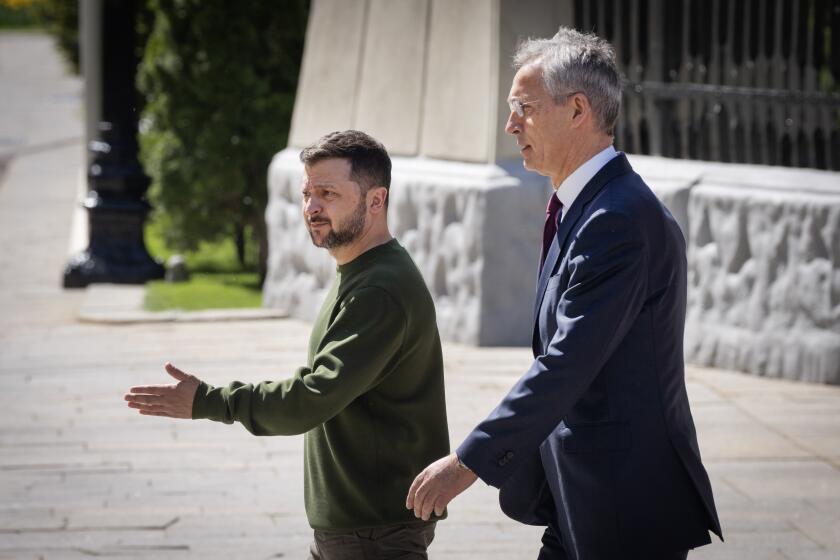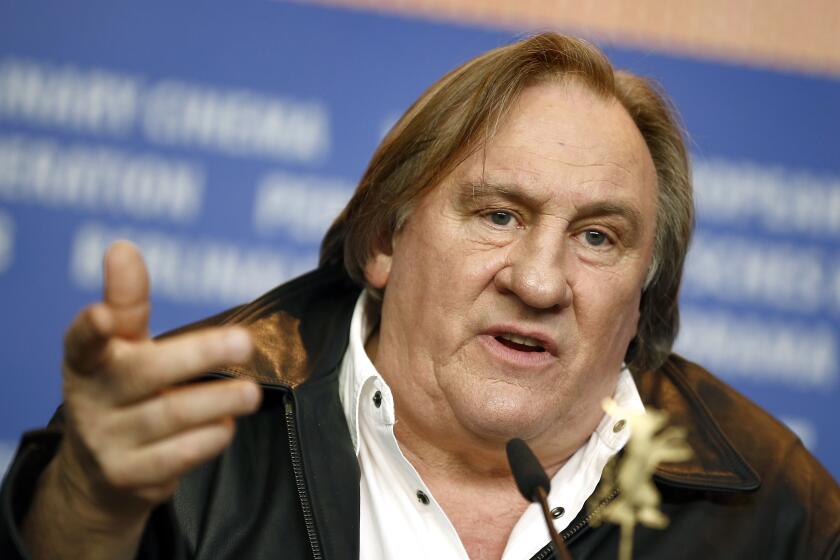Palestinian elation is mixed with Israeli anguish
The day was a jarring reminder that for those whose lives have been torn apart by the Israeli-Palestinian conflict, elation on one side often equates with anguish on the other.
“It’s a day of victory and pride to have my son back in my lap!” cried Umm Khalid, who embraced her son Fouad Abu Amrin, 39, for the first time in 15 years as he stepped off a prison bus at the Rafah crossing in the Gaza Strip.
Older and grayer than the 20-year-old who was sentenced to life in prison for murder, Abu Amrin was one of 477 Palestinian convicts released Tuesday in the first step of a 1,027-for-1 exchange for kidnapped Israeli soldier Gilad Shalit.
About 80 miles away in a coastal Israeli city north of Tel Aviv, embittered father Zeev Rapp, 66, sat at home and watched the television in disgust. In 1992, Abu Amrin stabbed Rapp’s daughter Helena, 15, in the heart as she was on her way to school. Now he was walking free with other smiling prisoners, flashing victory signs and kissing the ground.
“We feel as though our daughter has been murdered all over again,” said the Herzliya resident. “We are living through the pain again.”
For Israel, the lopsided exchange once again found leaders of the nation choosing between two of its deepest ideals: protecting security by refusing to negotiate with those it considers terrorists and never abandoning one of their own.
Nearly 300 of the 1,027 prisoners — the remainder will be released in two months — have been serving life sentences for murder or terror-related crimes.
For many in Israel, the only consolation Tuesday came from the first images, aired by Egyptian television, of a pale, gaunt Shalit, in a dark baseball cap, exiting a car in Egypt, which mediated the transfer. It was the first time Shalit had been seen publicly since Hamas, the militant group that controls Gaza and held Shalit, released a 2009 video, showing the lanky soldier, with dark circles under his eyes, reading a newspaper.
Shortly after his captors released him to the Egyptian mediators, Shalit was back on Israeli soil for the first time in more than five years. A photograph released by the Israeli army showed him flashing a grin while speaking on the phone to his parents.
A medical exam found him to be in stable health but weak. Doctors said he appeared to have been kept indoors and out of the sun, possibly for several years. He is expected to undergo numerous physical and psychological exams in the coming days.
During a brief interview on Egyptian television, before he was released to Israeli officials, Shalit appeared nervous and tired, but he calmly and politely answered an interviewer’s questions.
“I always believed that the day would come that I would be released,” he said, adding that he learned of the prisoner swap deal a week ago. “I have a lot to do when I’m free.”
Shalit said he was looking forward to spending time with his family and friends, and sharing his experience with them.
Asked whether he would work to help secure the release of other Palestinian prisoners held in Israeli jails, Shalit said he would be happy to see them reunited with their families and that he hoped the spirit of cooperation that led to his release would continue between Israelis and Palestinians.
“I hope this deal will advance peace and not lead to war,” he said.
The reunion with his family came shortly after a meeting with Prime Minister Benjamin Netanyahu, who told the nation, “Citizens of Israel, today we are all united in joy and in pain.”
Shalit was embraced by his parents and siblings at the Tel Nof air base, and the family returned to their home in a tiny northern Israeli town called Mitzpe Hila, where throngs of residents and journalists awaited them. The Shalits have requested privacy in the coming weeks as their son adjusts to freedom.
“We have experienced the rebirth of our son,” said Noam Shalit, the soldier’s father.
As the celebration proceeded in Gaza, where the former prisoners were honored like war heroes, tens of thousands of people gathered for nationalist and religious speeches by Hamas leaders and released prisoners.
The remarks from the stage and elsewhere included no signs of regret. Abu Amrin, for example, defended his stabbing of the Israeli schoolgirl nearly 20 years ago.
“Just as they have children and girls, so do we, and it’s our right to kill all those who came to kill our women and children,” he said of the apparently random attack, which took place as Helena was walking to a bus stop.
In Herzliya, the victim’s father said he could not understand how Israel’s government could release such a person. Zeev Rapp said he was so angry that he was considering renouncing his Israeli citizenship.
“I feel the country has gone morally bankrupt, that it has betrayed me,” he said. “I do not want to be a citizen in a state that has no law.”
Though polls showed that more than 70% of Israelis supported the prisoner deal, the issue exposed deep fractures over the wisdom of negotiating with Palestinian militants. Since 2000, nearly 200 Israelis have been killed by onetime Palestinian prisoners who were released by Israel in previous swaps.
Hamas leaders said the deal proved the effectiveness of armed resistance in combating Israel’s occupation of the West Bank and blockade of Gaza. Shalit was captured during a 2006 cross-border raid.
Early Tuesday morning, a handful of Israeli protesters lay across a road in northern Israel to prevent busloads of prisoners from being transferred from jails, saying they were representing “tomorrow’s victims.”
At an emotionally charged Supreme Court hearing Monday, relatives of past attacks angrily confronted Noam Shalit, who pleaded with the court to reject petitions from victims’ families to block the exchange.
“Look the crowd in the eye and admit that your happiness deepens our misery!” shouted Shvuel Schijveschuurder, who lost his parents and three siblings in the 2001 bombing of a Jerusalem pizzeria.
The court rejected the petitions late Monday night.
Among those released Tuesday were Palestinians convicted by Israeli courts of some of the most horrific attacks in the decades-long conflict.
Abed Hadi Ganaim seized control of a bus carrying Israelis in 1989 and drove it off a cliff, killing 16 people. After stabbing to death an Israeli military reservist in Ramallah, Abed Aziz Salaha raised his blood-covered palms in victory, an act that was captured in a photograph that remains seared in Israelis’ memory.
The 27 women released included Muna Jawad Ali Amna, who was accused of luring a 16-year-old Israeli boy over the Internet to meet her on the outskirts of Jerusalem, where he was shot to death.
About 40 of the most dangerous prisoners were deported to other countries, including Egypt, Syria, Turkey and Qatar. Nearly 300 were returned to Gaza and the remainder to the West Bank and East Jerusalem.
One of Israel’s most influential columnists wrote Tuesday that he feared the deal would only encourage Palestinians to use force rather than negotiations to achieve statehood.
“We ought to tell ourselves the truth,” Nahum Barnea wrote in the daily newspaper Yediot Aharonot. “We lost in this battle.”
News assistant Batsheva Sobelman in The Times’ Jerusalem bureau and special correspondent Ahmed Al-Burai in Rafah, Gaza Strip, contributed to this report.
More to Read
Start your day right
Sign up for Essential California for news, features and recommendations from the L.A. Times and beyond in your inbox six days a week.
You may occasionally receive promotional content from the Los Angeles Times.






